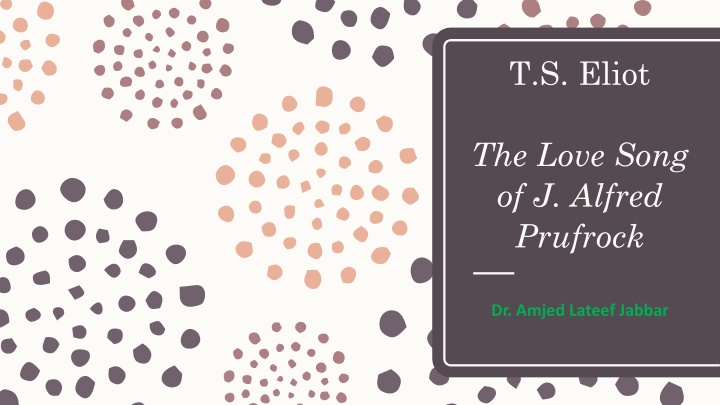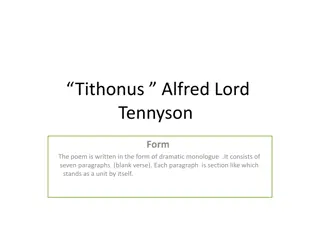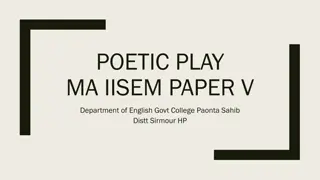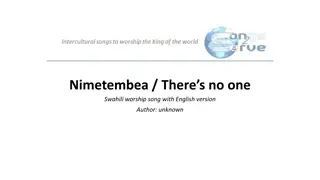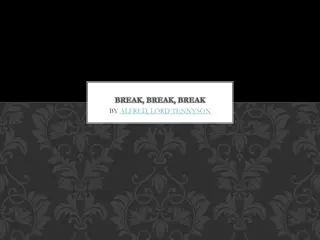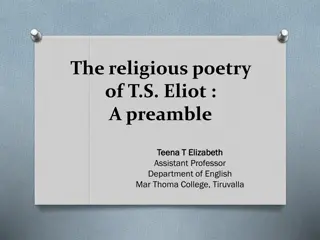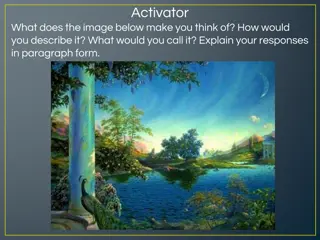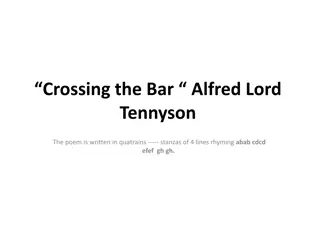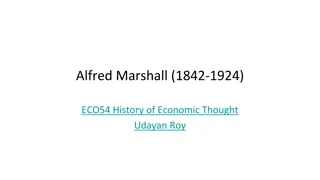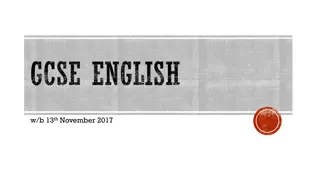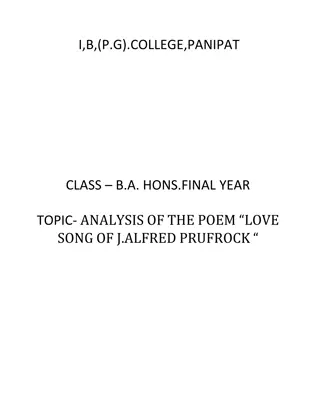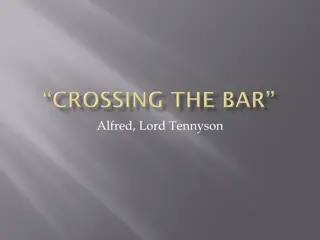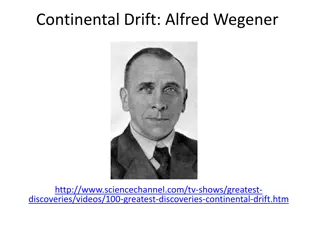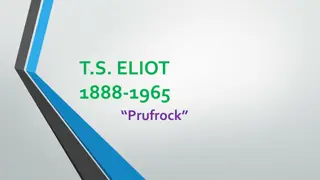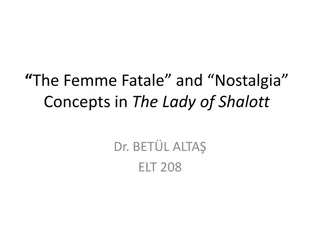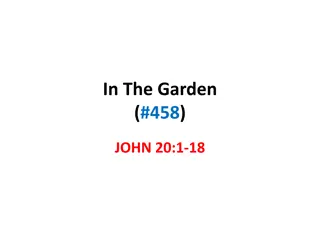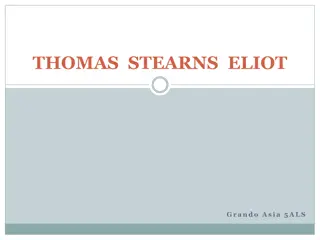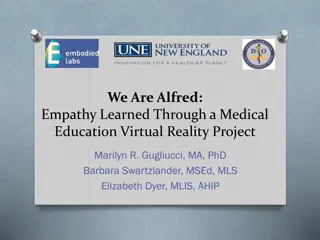The Love Song of J. Alfred Prufrock by T.S. Eliot Summary
"T.S. Eliot's 'The Love Song of J. Alfred Prufrock' sets a contemplative tone as the protagonist navigates streets filled with enigmatic imagery and self-reflection. The narrative delves into themes of indecision, the passage of time, and existential musings. The vivid descriptions paint a portrait of urban ennui and internal struggle, inviting readers to ponder life's complexities through the lens of a conflicted mind."
Download Presentation

Please find below an Image/Link to download the presentation.
The content on the website is provided AS IS for your information and personal use only. It may not be sold, licensed, or shared on other websites without obtaining consent from the author.If you encounter any issues during the download, it is possible that the publisher has removed the file from their server.
You are allowed to download the files provided on this website for personal or commercial use, subject to the condition that they are used lawfully. All files are the property of their respective owners.
The content on the website is provided AS IS for your information and personal use only. It may not be sold, licensed, or shared on other websites without obtaining consent from the author.
E N D
Presentation Transcript
T.S. Eliot The Love Song of J. Alfred Prufrock Dr. Amjed Lateef Jabbar
Summary "If I thought that my reply would be to someone who would ever return to earth, this flame would remain without further movement; but as no one has ever returned alive from this gulf, if what I hear is true, I can answer you with no fear of infamy. "Let's go then, you and I, when the night sky is spread out like a patient anesthetized on an operating table. Let's walk down half-empty streets, which are marked by sleepless, cheap hotels where people only stay one night, and by shabby, run-down restaurants. The streets follow each other like a boring argument with malicious intentions. They make you think of some urgent question... but don't ask what it is. Let's go and make our visit. Women enter and exit the room while talking about Michelangelo.
Yellow smoke rubs its back against the windows; it rubs its snout all over the windows, licks the corners of the night with its tongue, lingers above the stagnant water in the drains, mingles with soot from the chimneys, slips by the patio, and suddenly jumps but seeing that it's a cool autumn night, curls around the house and fades away. Yes, there will be time to look at the yellow smoke that slides along the street, rubbing itself against the windows. There will be time, there will be time to prepare to meet people; to murder and create; for work and answering questions; time for both of us. And there will be time, still, for a hundred indecisions, to change my mind a hundred times, all before afternoon tea. Women enter and exit the room while talking about Michelangelo.
Yes, there will be time to ask, Do I dare? And again, Do I dare? Time to turn around and go back downstairs, worried about the bald spot on the back of my head. (People will say: "His hair is really getting thin!") I'm wearing my morning coat, with my collar buttoned all the way up to my chin, along with an expensive but not overly showy necktie with a simple tie clip. (People will say: "His arms and legs are so skinny!") Do I have it in me, or am I brave enough, to change the world? A single minute contains enough time to make decisions and changes, although I'll just change my mind again a minute later. That's because I have done it all already. I've seen it all: I've experienced evenings, mornings, and afternoons, and I could measure out my life by the number of coffee spoons I've used. I've already heard the voices singing in the other room. So what gives me the right?
And I already know how people look at me. I've seen all the looks people givethe way people look at me and dismiss me with some clich d phrase, fixing me in their gaze like I'm an insect specimen pinned and wriggling against the wall. So how should I start to spit out the memories of my life, like the butt-ends of a cigarette? And what gives me the right? And I already know what women are like. I've known all kinds of women those whose arms are covered with bracelets and have pale, hairless skin (although in the lamplight I can see that their arms are covered in light brown hair). Is it the smell of perfume from a dress that's making me lose my train of thought? I'm thinking of arms resting on a table, or wrapped up with a shawl. So what gives me the right? And how should I begin?
Should I say: I've walked in the evening through narrow streets and watched lonely men leaning out of windows and smoking in their under shirts? I should have been a creature with worn-out claws, scurrying across the floors of the silent ocean. And as it gets later in the day, the night itself seems to sleep so peacefully! It's as if it's been stroked to sleep by long fingers. It's either asleep or tired or maybe it's just pretending to be asleep, stretched out on the floor beside us. Should I, after afternoon tea, have enough strength left to disturb this moment and cause drama? I cry, refuse to eat, and pray and like John the Baptist, I've seen my (now slightly bald) head brought in on a plate. But even so, I'm no holy messenger, and I don't have anything very important to say. There was a time when I could have been great, but that moment has passed for good; I've seen death's butler hold my coat, but he just laughed at me. And to put it bluntly, I was scared.
And would it have been worth it anyway? After all the afternoon tea, as we were sitting among the porcelain teacups and talking idly, would it have been worth it to force a smile and bring up the problem I'm thinking about? To have smooshed and simplified this huge, all-encompassing problem into a manageable bit, like a ball, and then have rolled it towards some question that's so big, it's hard to articulate or understand? To say: I am Lazarus, come from the dead, come back to tell you everything, I'll tell you everything ? If someone, fluffing up her pillow, should say: That is not what I meant at all; That is not what I meant, at all. And would it have been worth it anyway? Would it have been worth it, after everything I've seen in life: the sunsets and the dooryards and the streets sprinkled with rain? Would it have been worth it after the novels, after the teacups, after the skirts that graze the floor and all of this, and so much more? I can't say what I want to! But if a magic lantern could take my nervous thoughts and put them in patterns on a screen that became words: Would it have been worth it while fussing with a pillow or taking off a shawl, and turning towards the window to say: That is not it at all; That is not what I meant, at all.
No! I'm not Prince Hamlet, and I was never meant to be. I'm just a background character, a lord following the prince who can serve to fill a crowd, begin a scene or two, or give the prince advice. No doubt I'm an easy tool, subservient and happy to be useful. I'm polite, cautious, and careful; full of lots to say, but what I say is obscure and unclear. Sometimes I'm ridiculous sometimes I'm even almost like a clown. I'm getting old. I'm getting old. l'll start rolling up the bottoms of my pants. Should I part my hair in a different place? Can I be bold enough to eat a peach? I'll wear white flannel pants, and walk on the beach. I have heard the mermaids singing to each other. I don't think those mermaids will sing to me. I have seen the mermaids riding towards the sea on the waves, the wind whipping up the waves' foam and making the water look like a swirl of black and white. We've been waiting in the rooms underneath the sea, next to mermaids wrapped in red and brown seaweed waiting for human voices to wake us up, and then we'll drown.
Themes 1. ANXIETY, INDECISION, AND INACTION The speaker in The Love Song of J. Alfred Prufrock is paralyzed by indecision. The poem s momentum is continuously frustrated by digressions the speaker's thoughts trailing off in seemingly unrelated directions and by the speaker s sense of his inadequacy. By depicting the speaker s intense struggle with indecision, the poem suggests that excessive preoccupation with doing the right thing whether when expressing yourself, forming relationships with others, or simply deciding how to style your hair or what to eat can actually stop a person from ever venturing forth into the world or, in fact, doing much of anything at all. From the beginning, the poem sets up a juxtaposition between action and inaction. The first line states let us go, implying that the poem will move forward in time and space in other words, that it will go somewhere. But that momentum is quickly stalled. These streets follow like a tedious argument of insidious intent, suggesting that the various paths they offer up feel both boring and threatening that there is no clearly good path to take. And though the speaker says that the streets lead you to an overwhelming question, the speaker doesn't actually pose that question. Instead, he explicitly says not to inquire further: Oh, do not ask, What is it? Maybe the question is just which direction is best to walk in or, indeed, where they're going in the first place simple queries that become hurdles in the speaker's mind.
In any case, the speakers habitual procrastination seems to be rooted in social anxiety, since, paralyzed with fear about making the wrong choice, he appears to find even basic decisions about what to eat or how to dress overwhelming. In fact, the speaker admits that he finds time for a hundred indecisions, / And for a hundred visions and revisions, all before sitting down his afternoon tea! He imagines descending the stair and greeting people, but in reality he is too timid to do so because he imagines that people will laugh at his bald spot and shabby clothing (which, in turn, suggest that the speaker is getting older and that he has been wasting his time with all this indecision). What s more, it s not just that the speaker can t follow through on his planned actions. He doesn t even seem to know how to begin to ask the overwhelming question. Instead he asks how should I begin? and how should I presume? suggesting that he feels incapable of overcoming the first hurdle to taking action. He repeats those phrases at the end of two different stanzas, giving the impression of a stuttering or repeated failed start. For the speaker, trying to make the best choice repeatedly results in no choice at all. He is also paralyzed by a feeling of his own inadequacy, as implied by his reluctance to presume and his repetition of the phrase Do I dare? He doesn t take action, in other words, because he doesn t feel that he has the right to do so. Overcoming indecision requires agency, but the speaker remains trapped in his repeating patterns because he feels that he can t dare to do anything.
There are times when the speaker does seem close to doing something, but the poem ultimately indicates that wanting to act isn t enough. Taking meaningful action, it suggests, requires that an individual dare to make a choice without being certain that it s the best choice a risk that the speaker can t bring himself to take. And while the speaker thinks he'll have plenty of time to do things, this seems like wishful thinking. Given his propensity to waffle about every little decision, he'll likely continue to agonize over his choices until there's no time left his indecision having stopped him from living a full life.
2. DESIRE, COMMUNICATION, AND DISAPPOINTMENT Although the speaker in The Love Song of J. Alfred Prufrock might appear silent and affectless to others, his interior life is alive with hope and desire. In particular, he appears to have a deep longing for romantic connection but he struggles to communicate that desire, and so it remains mostly unfulfilled. Indeed, despite being a love song, the poem never quite manages to discuss love itself; instead, it stays bogged down in the false starts and half-finished thoughts that characterize the speaker s attempts at connecting with other people. The poem makes it clear that people like the speaker can only really experience love by breaking through these communication barriers, but it also embodies just how difficult doing so can be. There are a few key moments in the poem that suggest the speaker feels romantic or sexual desire for women, but is unable to express those feelings. For example, he asks at one point if it is perfume from a dress that distracts him, and he is preoccupied with the image of a woman s arms that lie along a table, or wrap about a shawl a fixation that seems erotic. However, his desires are soon stymied by self-doubt and recrimination. He asks himself: "And should I then presume? And how should I begin? These repeated questions show that he doesn t know how to begin a conversation with a woman and thinks that it would somehow be presumptuous to do so.
The speakers sense of thwarted communication is so strong that it even colors his fantasies. When the speaker imagines expressing his desires and feelings to others, those scenes inevitably dissolve into disheartening moments of misunderstanding. For instance, the speaker imagines posing what he calls the overwhelming question, saying I am Lazarus, come from the dead, / Come back to tell you all, I shall tell you all. However, although the speaker compares himself to the Biblical figure and offers the promise of total revelation to tell all he doesn t actually manage to communicate much of anything. Instead, he imagines his listener falling asleep and needing a pillow by her head. Even in his fantasies, then, he experiences the disappointment of being unable to communicate, protesting: That is not what I meant at all; That is not it, at all." The speaker s attempts at communication only grow less effective as he is overcome by hopelessness and disappointment. By the end of the poem, the speaker s disappointment seems to have hardened to the point that it has become entrenched within him; he doesn t seem to expect that his desires will ever be fulfilled. He describes the singing of mermaids in exquisite detail, but admits: I do not think that they will sing to me. Instead, he remarks that he [grows] old. Because the speaker s efforts at communication have been unsuccessful, he gives up on trying, instead imagining that his opportunity to share his hopes and dreams has already passed. The speaker s exclamation partway through the poem that it is impossible to say just what [he] mean[s] underscores exactly how interconnected desire, communication, and disappointment are for the speaker. His frustration suggests that romantic fulfillment requires clear communication something the poem indicates the speaker cannot do.
3. MODERNITY AND ALIENATION The Love Song of J. Alfred Prufrock is often regarded as one of the quintessential modernist" poems, reflecting the social and intellectual conditions of the early 20th century. The poem emphasizes exciting features of modern life like electricity and new medical technologies but it also suggests that modernity comes with a persistent sense of alienation and isolation from others. Through the example of the speaker, the poem indicates that the modern condition essentially results in feeling alienated from the world. The poem refers to several technologies that would have been relatively new in the early 20th century, like lamplight, industrial factories, and anesthesia in hospitals. At the same time, all this new activity and industry seems to have left the speaker behind. He describes how the yellow fog slithers through the streets like a cat that rubs its back upon the window-panes, but he rarely interacts with actual people, as the streets are half-deserted. The smog seems more alive to him than the people themselves. The speaker already seems weary of this new world, in which events follow one another in a repetitive, cyclical fashion. He claims: I have known them all already, known them all; / Have known the evenings, mornings, afternoons, / I have measured out my life with coffee spoons. He suggests that nothing can surprise him anymore or disturb the normal rituals of polite society. For the speaker, taking action would mean to force the moment to its crisis, which seems an impossible task after the civilized, sedate activity of taking tea and cake and ices. There is thus something emotionally deadening and alienating about the seemingly empty social rituals that characterize the modern world.
Modernist literature was also often characterized by rejection of traditional figures of authority. In keeping with this tradition, the poem deconstructs the traditionally respected pillars of Western culture, religion, and literature, leaving the speaker feeling isolated and pessimistic about his diminished connection to those traditions. For example, the speaker comments ironically that he is no prophet, like John the Baptist, and that rather the eternal Footman hold[s] my coat, and snicker[s] (basically, death laughs at him). The poem thus makes its protagonist an object of mockery rather than a figure of greatness. The speaker himself seems to feel an inability to measure up against these literary greats, as when he proclaims that I am not Prince Hamlet, nor was meant to be, and is simply a nameless, subservient attendant lord or even a Fool. He doesn t draw strength or inspiration from these would-be authority figures of literature and culture; instead, they leave him feeling isolated and disheartened. This reaction suggests that modernist trends in literature may only enhance the alienating experience of living in the modern world. The Love Song of J. Alfred Prufrock suggests that, for all the wealth and technological comforts of modern life, there is something profoundly alienating about this new way of experiencing the world. The speaker feels unable to participate in the social life of the world around him or to relate to the literary context that has come before him. Modernity doesn t connect him more with others; it just leaves him feeling even more alone.
Symbols 1. Yellow Fog When the speaker of Prufrock invites his listener to go on a walk with him, he imaginatively walks through a city filled with fog. This fog is described as yellow, since it reflects the electric light that powers the lamps and streetlights and, implicitly, the pollution and smog of a modern industrial city. The yellow color of the fog is thus symbolic of the condition of modern life, which is shaped by technology and industrial production. This fog seems to pervade the streets and homes of the people who live there. It is described as rubbing, licking, and lingering along the windows of houses and among the city streets. The inescapable quality of the fog suggests the difficulty of evading the ills of pollution in a modern city. It also gives the poem a more abstract but still pervasive sense of unease, as if the entire city is colored by the seediness, corruption, and darkness with which the speaker characterizes the world around him. With the language of rubbing and licking, the fog is also likened imaginatively to a cat, a comparison that adds to the sense of unease. It is as if the fog is a living organism that takes on more life than the humans around it, symbolizing the speaker s sense of alienation and isolation in a modern and literally and figuratively foggy world.
2. Toast and Tea The poem is markedly, even oddly preoccupied with tea. In one sense, this reflects the cultural dominance of tea in early 20th century British culture, in which tea and the consumption of sandwiches and toast was a common, almost universal afternoon ritual. But in the poem, the seemingly quotidian and everyday objects of toast and tea also take on a symbolic function. For the speaker, they come to symbolize the banal and suffocating qualities of modern life, in which the same rituals proceed day after day. The speaker feels constrained by these rituals, and yet he also seems incapable of breaking free of them. He asks do I dare to eat a peach? but even the simple decision of changing his eating and drinking routine seems to be too much for him. His anxiety makes it nearly impossible for him to take decisive action, leading him to proclaim that he goes through a hundred visions and revisions before taking his tea. In this sense, tea represents both the stifling force of social convention and the speaker s inability to claim the agency to make different choices.
Form, Meter and Rhyme 1. Form The Love Song of J. Alfred Prufrock doesn't follow a traditional form; its line and stanza lengths vary dramatically throughout. However, one literary form that it definitely does follow is the dramatic monologue a direct address between the speaker and the reader. This is a highly intimate form that emphasizes the close connection between the speaker and the listener or reader to whom he has chosen to reveal his secrets. This expectation of revelation is established very early on in the poem through its epigraph, taken from Canto 27 of Dante s Inferno (a poem that narrates a Pilgrim s journey through Hell). Translated, the lines read as follows: If I thought that my reply would be to someone who would ever return to earth, this flame would remain without further movement; but as no one has ever returned alive from this gulf, if what I hear is true, I can answer you with no fear of infamy.
The lines are spoken by Guido da Montefeltro, a sinner confined in Hell. Feeling confident that the Pilgrim will not be able to return to earth to tell his story, he promises to confess all his sins. These lines thus set up the expectation that the speaker of the poem, like Guido, is about to confess his sins in the form of a direct address, a private conversation between himself and the reader. Since these lines are set in Dante s Hell, it also implies that the world of Prufrock is also a kind of Hell from which the speaker cannot escape. In a further twist, however, Dante s Pilgrim does eventually escape Hell and return to earth. This turns the reader of Prufrock into a Danteesque figure who can go to Hell and live to tell the tale. The poem s status as a dramatic monologue explains the speaker s continuing digressions and shifts to other seemingly, unrelated topics. The form allows the poet to experiment with a stream-of-consciousness style of narration in which the reader is given access to the speaker s thoughts exactly as they cross his mind. This gives the poem an immediacy that is arguably lacking in other, more traditional literary forms of narration.
2. Meter The Love Song of J. Alfred Prufrock at first might look like it has no discernible meter. Its patterns of stresses often significantly diverge in the course of even a few lines, and it can t be said to fit many of the traditional meters. However, although the poem doesn t follow any one particular meter all the way through, it does move in and out of different meters. This formal flexibility allows the poet to experiment with and interrogate different metrical forms, just as he experiments with and questions many of the traditional assumptions of the Western literary and cultural tradition. Much of the poem is written simply in "free verse" verse with no meter to speak of, as in lines like 120 and 121: I grow old ... I grow old ...I shall wear the bottoms of my trousers rolled. These lines don't follow any discernible meter, in a formal laxity that mirrors the speaker's own sense of lack of direction and meaning. At other moments, however, the speaker employs blank verse in iambic pentameter, with its alternating pattern of five stressed and five unstressed syllables. Note lines 73 and 74: I should have been a pair of ragged claws Scuttling across the floors of silent seas.
This is not perfectthere is a trochee opening line 74but it is still quite regular compared to other lines of the poem. It might seem odd that the speaker should employ one of the most traditional and respected meters in English literature in a poem generally noted for its anarchic and innovative "free verse." However, the speaker frequently uses these traditional meters in order to question and deconstruct them. For example, he sometimes also uses hexameter (in both iambic and trochaic forms), the traditional six- foot unit of heroic classical poetry, (seen, for example, in The Odyssey). However, these uses are rarely "heroic" in the conventional sense, and instead often contribute to descriptions of unsettling or disturbing images, a in lines 2 and 3: When the evening is spread out against the sky Like a patient etherized upon a table; It is startling to see this trochaic hexameter used for descriptions of surgery and anesthesia. Even when the poet does use traditional metrical forms, the subject matter focuses on the conditions of modern life. In this way, the poet is inaugurating a new form of poetry that uses traditional meters for untraditional purposes.
3. Rhyme Scheme "The Love Song of J. Alfred Prufrock" is written largely in blank verse, meaning that it doesn't rhyme. However, this is not to say that the poem makes no use of rhyme. On the contrary, rhyme makes frequent albeit inconsistent appearances in the poem. For example, the first two lines feature an AA rhyme: Let us go then, you and I, When the evening is spread out against the sky. Such AA rhymes appear at various places in the poem. Other lines use an AABB pattern, which also appears in the first stanza: Let us go, through certain half-deserted streets, The muttering retreats Of restless nights in one-night cheap hotels And sawdust restaurants with oyster-shells: Rhyme thus has an oddly prominent role at the beginning of a poem that generally does not use end-rhymes. Clearly the poet is still making a significant use of rhyme, even when he seems to turn away from it. Rhyme is given similar prominence in the poem's most frequently-used refrain, the rhyming couplet, which also follows an AA rhyme scheme: IN the room the women come and go Talking of Michelangelo,
The poem also features use of rime riche, the repetition of the exact same word at the end of the line. This appears in lines 15-16, which rhyme "window-panes" and "window-panes. Often, though, the speaker's rhyme pairings seem comical or deflationary, as in lines like these: Should I, after tea and cakes and ices, Have the strength to force the moment to its crisis? I have seen the moment of my greatness flicker, And I have seen the eternal Footman hold my coat, and snicker "Flicker" is paired with "snicker" and "ices" is paired with "crisis," in two incongruous associations. The pairing of "crisis" with "ices" makes the speaker's predicament seem less serious and even comical. Similarly, "snicker" is a deflation of the speaker's sense of his possible "moment of greatness. Rhyme, then, has an ambiguous function in the poem. It is seemingly not, as it would have been for 19th-century poets, an opportunity for the poet to show off his virtuosic skill with language. Instead, at the turn of the 20th century, when "Prufrock" was written, rhyme starts to look in this poem like something a bit silly and outdated an opportunity to show what is absurd about the world, rather than a performance of artistic accomplishment.
